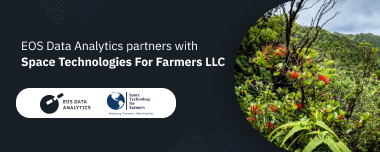EOS Data Analytics (EOSDA), a global provider of AI-powered satellite imagery analytics, has signed a partnership agreement with Hawaii-based Space Technologies for Farmers LLC, a firm that fights climate change through tools and solutions for reforestation and farming.
By working together, in collaboration with local governments and groups, Space Technologies for Farmers will be able to combat climate change in Eastern Africa at no cost to end users.
Space Technology for Farmers LLC (STF) was founded to combat climate change by providing sustainable forestry and farming tools and solutions in native forms. STF provides such solutions at no cost to end users by collaborating with governments, NGOs, and local enterprises in Eastern Africa and other regions.
The collaboration with EOSDA will enable Space Technology for Farmers to gain access to a professional-level subscription for EOSDA Crop Monitoring, an online satellite-based precision agricultural platform for field monitoring, to enhance its solutions for sustainable farming.
The longer-term objectives of the partnership between the duo are aimed at expanding the reach of Space Technologies for Farmers’ solutions in the markets of Eastern Africa in 2022 and early 2023.
Read also: Nigeria Proposes Debt-For-Climate Swap Deal To Enable Africa’s Energy Transition
Importance Of Agrotechnology For Farming
Agriculture is an essential part of the African economy. The continent is rich in natural resources, and the climate allows a wide range of crops to be grown. At the same time, about 600 million hectares of land on the continent are uncultivated.
Despite a lack of industry players, Africa’s regional markets are large. More than half of the land in sub-Saharan Africa is used by farmers who cultivate small plots. As a rule, they grow food or commercial crops on these lands.
More than 170 million people are employed on farms. Despite the landscape’s advantages, its translation into economic development requires effort and transformation. The difficulty stems from several aspects. The first is the difficulty in acquiring land and obtaining property rights. The second significant problem is poor infrastructure. Bad roads and electricity problems make agriculture unprofitable and uncompetitive.
Modernization is at the forefront of efforts to transform the agricultural sector, designed to help increase farm profitability and employment by making the industry attractive to young people. Modernization will provide an opportunity to develop agricultural value chains in Africa, leading to job creation. Of course, the modernization of any industry will not do without the introduction of technology. Geospatial data analysis in farming is one of the leading technologies transforming agriculture today, providing farmers with more opportunities.
According to Brijesh Thoppil, Director of Strategic Partnerships at EOS Data Analytics, “EOSDA continues to expand its partner network to help local markets get tools for sustainable farming and reforestation. Through the partnership with Space Technology for Farmers, we are looking forward to making sure even more parties in the agriculture markets of Kenya and India can advance in their smart farming practices and get insights for data-driven decisions using remote sensing technologies.“
“Partnering with EOSDA will allow us to be able to package great benefits to our end users quickly and economically. When working with such an established and mature technology supplier, we can just focus on the implementation of technology to receive desired results“, said Raj Budhabhatti, CEO of Space Technologies for Farmers.
Other Organizations for the EOSDA Project
For the development of technology to fight climate change, EOS Data Analytics (EOSDA) also partner with Zimbabwe-based TelOne organization for strategic operation
Since 85% of Zimbabwe’s land is used for agriculture, farming activities in the country provide employment and income for two-thirds of the population and contribute approximately 17% to Zimbabwe’s GDP. Still, the number of people with insufficient food consumption has grown by 500 00 during 2022 alone. Hence empowering agribusinesses with the latest technologies is crucial to the country’s development and its people’s well-being.
TelOne is a government-owned company providing communications and digital solutions for customers in Zimbabwe. It aims to facilitate a digitally enabled society in the country in all sectors of its economy, including agriculture.
Partnering with EOSDA will allow TelOne to establish itself in the smart agriculture sector and assist Zimbabwe’s government, farmers, financial institutions, and other players in the agriculture value chain to create value for communities and the country’s economy.
Within the cooperation with EOSDA, TelOne will get a professional-level subscription to EOSDA Crop Monitoring, an online satellite-based precision agriculture platform for field monitoring.
“Humanity’s going through rapid changes that require us to make quick digital transformations,” says Thoppil, director of strategic partnerships at EOS Data Analytics. “Since Africa is set to become a global hub for agritech, new developments in the African agricultural sector and in Zimbabwe specifically can bring multiple benefits to the industry’s stakeholders and uplift the smallholder farmer communities. That’s why we’re so excited about this strategic partnership with TelOne.”
“TelOne remains committed to coming up with digital solutions that seek to facilitate a digitally enabled society by 2023,” says Melody Harry, head of corporate communication at TelOne. “With agriculture being a major contributor to the nation’s GDP, it is imperative that we come up with solutions for this key sector.” By partnering with EOSDA, we bring a tried and tested state-of-the-art crop monitoring and remote sensing solution that will go a long way in assisting the nation to achieve food sustenance. “
